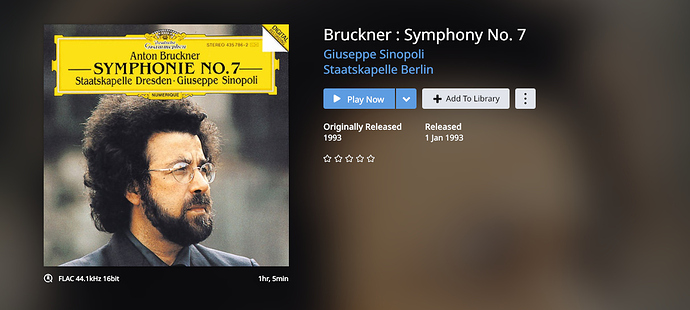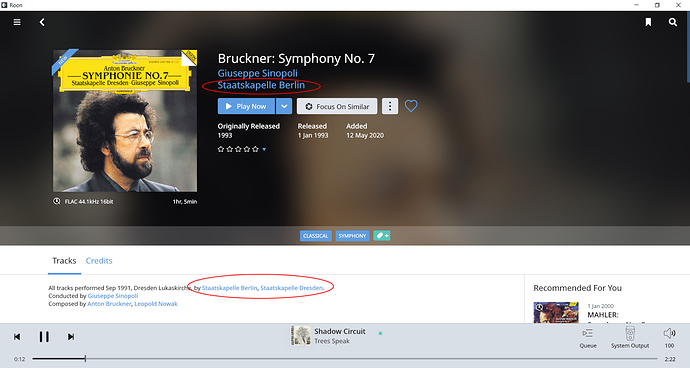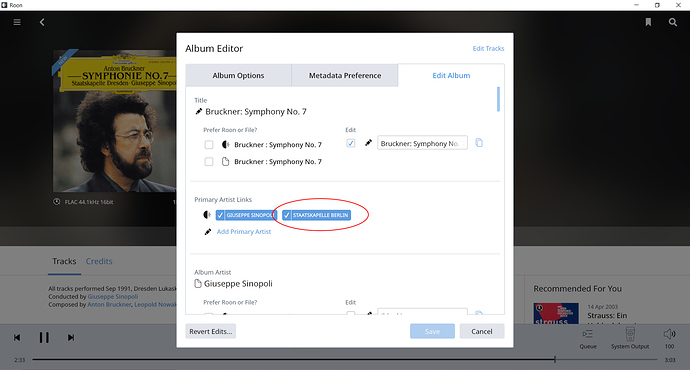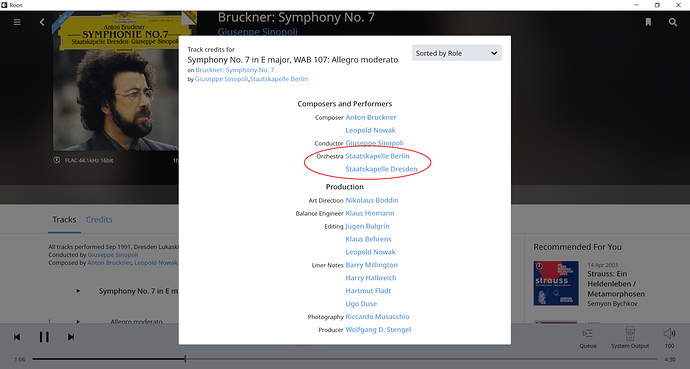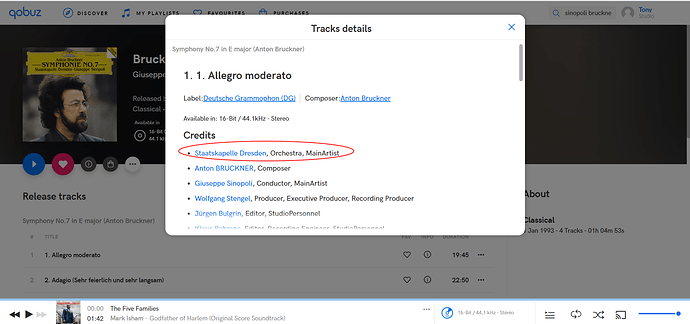Bruckner’s 7th Sinopoli is listed as Staatskapelle Berlin but it is actually the Staatskapelle Dresden.
Bad metadata from rovi:

Thanks for the report, @James_O_Leary — We are investigating this.
Dresden is a better orchestra, and they have a great hall to record in as well.
BTW. I have this album added to library from Qobuz. There is a lot more going on that bad metadata from Tivo. In this case there is a credit for both Dresden and Berlin Staatskapelle.
In this case the Primary Artist is set to Staatskapelle Berlin, but here are two orchestra credits for both Berlin and Dresden Staatskapelle:
On Qobuz the credit is correctly Dresden. So it seems roon is mashing up credits from at least 2 sources.
I am seeing this a lot. It is resulting in a lot of duplicate credits, particularly with Vocal music and as here conflicting credits. I have seen several other cases where there are two orchestra credits like this which cannot be explained away by an uncatalogued equivalence because they are two completely different orchestras so the more likely issue is stemming from the way in which two or more data sources are aggregated.
The recording studio indeed hosted some fine musicians over the years. This surely isn’t the complete list, but gives an impression…
I suppose Roon “enriches” the qobuz metadata with it’s own which are, thanks to rovi, not quite right.
which would not have stopped him appearing as a guest conductor. What I am trying to say: this is complex. You will not be able to fix this by artificial intelligence (=guesswork). You will only fix this my high quality metadata from ONE source.
I agree with that aggregation stuff: Whoever had that stupid idea should probbaly look out for a new job. You don’t make data better by aggregating errors from two or three sources.
I don’t think that “aggregating” two or more data sources is “enrichment”. The data sources often conflict or contradict each other. Enrichment will need much deeper rules processing than seems to be currently the case. Especially when there is a red flag of a direct contradiction between the data sources. To resolve this case would require deeper rules such as:
- Two orchestras are rare
- Bruckners 7th is not scored for two orchestras
- Sinopoli never held a post at the Staatskapelle Berlin
Realistically, I can’t imagine roon ever getting to that point. Perhaps a more realistic approach would be “trust” scores of the different data sources depending on performance. For example, I would be inclined to trust Qobuz over Tivo for the Classical genre wherever there was a contradiction. Maybe there are more objective, statistical reasons to support that intuition in the data that roon has.
There are several feature requests for this. I would also like more granularity for several roles that are currently aggregated like this.
Dnt know what happened - I overwrote my first post. …
I’d consider the case at hand as an accident. As a general approach, combining data sources has a certain potential to improve the quality of the resulting data set. OK, not always, we see that - but by pointing this stuff out we hopefully contribute to some improvement. And I agree, there’s some kind of knowledge needed which the algorithm at work here needs to develop and apply. The machine has to learn … not sure how well this will work out without any manual curation besides the one internal QA and the community here provide.
Not sure if this would (always) work, this probably also differs from label to label. I haven’t really digged very deep into how qobuz does metadata but I think its relying on labels to provide the data.
I think that is true of many genres. I certainly see that in my own library where there is an entirely benign effect of the “gaps” in one data source plugging the “gaps” in the other data source to produce a more complete data set. The problem is that is not the case for all genres. Classical is a prime example but there are others. Instead the effect is often to produce a lot of duplicates, contradictions, and compounding of errors in addition to the plugging of gaps in multiple data sources. I have actually seen this confusion of the Dresden and Berlin Staatskapelle in several other cases and I often get duplicate and even triplicate orchestras particularly with larger cities with many orchestras. But for the most part I have given up reporting these types of errors where it is possible to fix manually.
Capturing all the rules needed, deep in the structure of a genre like Classical to correlate contradictory data sources is a very long way in the future I would have thought. TBH I wonder if being able to specify, perhaps on a genre by genre basis, a single roon data source rather than the current default of “all of them” would produce better results. With some genres I would rather forgo the most complete data set possible for less duplicates, contradictions and compounding of errors. There are many examples but another one is role assignment with Opera. So my roon library is littered with duplicates and triplicates of identical singers with “Vocals”, “Soprano”, “Soprano (Vocals)” etc. credits or “Alto” and “Contralto” which may also be the result of data source aggregation.
Closed due to inactivity. If you are still seeing this issue, please open a new support thread.
